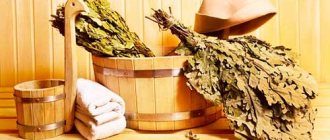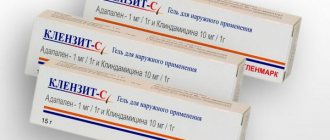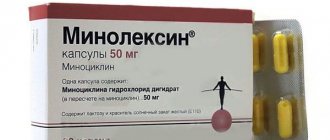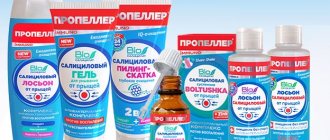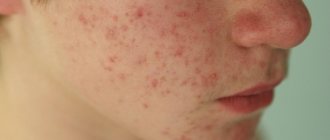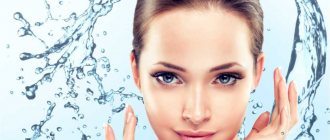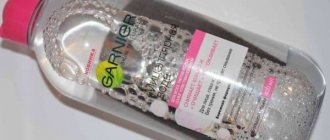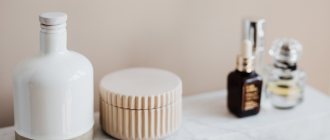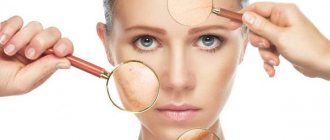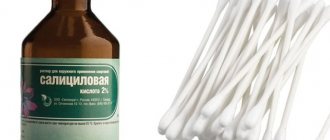It is very rare now to meet a person who does not have a single pimple on his face. All these are environmental consequences: polluted air, bad water, low-quality products. The dirtier the area in which a person lives, the worse the organs function, and this is reflected in the skin. The water problem ranks first among other problems in many cities. Dirty water contributes to the formation of acne and even boils. Mineral and salty can cure rashes.
Can acne appear after drinking water?
There are really many factors that can provoke the occurrence of acne. This includes cold, unhealthy food, improper care, and even just age or genetics. But in reality, there are only three mechanisms: either clogged pores, or microbes, or internal problems. And it seems that ordinary moisture definitely has nothing to do with it: after all, at first glance, there are no connections and there cannot be. However, many people claim that they get acne after drinking water. In this part of the article we will figure out whether this is possible in principle and how to protect yourself if this is true.
The effect of moisture on the body can be either external (when we wash our face, for example) or internal (when we drink). Therefore, we will look at both methods of using it and tell you whether acne can occur in both cases.
Can acne occur from washing your face with tap water?
Many beauty bloggers often say that they began to abandon wet cleansing of their facial skin, and began to gradually switch to waterless: micellar water + toner. This is argued by the fact that running water in large cities cannot boast of particular purity and safety. The last statement is certainly true, but in reality, can acne appear from tap water?
Answer: of course. Running water is poorly purified and is infested with germs that really harm the skin. But is it worth abandoning the wet method of cleansing the skin? Naturally not.
The fact is that even though tap water is harmful, it is an indispensable part of daily skin cleansing. It washes away most of the dirt from the skin. Plus, in the process of washing we usually use foams, gels and scrubs, which also help the epidermis to nourish, moisturize and renew itself. The “dry” method excludes the use of such products.
Is this a contradiction? After all, it seems like it’s doing harm. But at the same time, you cannot refuse it. What to do? The answer is simple: wash your face with water, but don’t forget to cleanse your skin with tonic afterwards. We have repeatedly said that it is important not only to soothe the skin, but also to further cleanse it. Including from microbes contained in running water.
Can acne appear from drinking water?
This is a more clear-cut question. Of course not. The fact is that if you drink water, then in itself it certainly does not cause any harm to the epidermis. Moreover, she even helps him very well. But we will talk about this in the next section of this article. Now let’s just say that no - acne from drinking regular, purified H2O definitely cannot happen.
But acne from drinking tap water is a very real situation. Especially if you live in a big city. Again, it is extremely dirty and needs to be cleaned with a filter. As a last resort, buy a clean one. Because if you drink running water, you can count on much more serious problems than acne.
Skin care application
Rose hydrosol is an indispensable product for caring for various skin types. The list of situations when a miracle product made from rose petals will be useful is quite impressive:
- wash your face with a mild toner in the morning to refresh your face and in the evening after removing makeup;
- Before going to the beach, spray your body well with a spray bottle. The tan will lie evenly and smoothly, and the likelihood of sunburn will decrease;
- If you have excessive sweating of your feet, take baths with a natural rose infusion. This procedure will relieve swelling, heaviness, and refresh the epidermis;
- If your eyes are very tired, rub a few drops of aromatic water into your eyelids. You can apply cotton pads soaked in a wonderful remedy to your eyelids for 5 minutes;
- In the summer heat, moisturize your skin with rose water a couple of times a day. Always carry a spray bottle and treat exposed areas of the body. Freshness, absence of dryness, tightness of the skin, delicate aroma will delight you;
- for severe headaches, fatigue, irritation, pour 2 glasses of rose water into a full bath, lie down for 20 minutes. It is advisable to carry out this useful procedure for irritation, dryness, rashes;
- use healing water to prepare masks. The compositions are suitable for all types of epidermis;
- A simple procedure will help you cope with dark circles under your eyes and puffiness. Apply gauze or a napkin soaked in pink water to your eyelids and under your eyes. After 5–10 minutes, rinse your skin with cool water;
- when the temperature rises, wipe your body with water infused with delicate petals, or spray from a spray bottle;
- For headaches, you can not only take a bath with rose petal tonic, but also put a cold compress on your forehead with this wonderful remedy.
Note! If you have irritation in your mouth or your mucous membranes are inflamed, rinse your mouth with healing pink water every half hour before going to the dentist. A light antiseptic will alleviate the condition and reduce unpleasant symptoms.
Find out interesting information about the properties and uses of rosehip oil for the face and body.
How to use micellar water? All the secrets of using it for the face are described on this page.
Does water help acne?
In the previous section, we promised to tell you whether water can help get rid of acne. And we keep this promise. In fact, there are a huge number of methods to combat and prevent acne, and consuming more fluids is one of them. This advice can be found in many articles and videos about skin care. Therefore, in this section we will talk about whether ordinary, purified water helps against acne.
And, again, we will return to the fact that we use liquids in two ways: we wash ourselves and we drink. Therefore, we will also consider the question regarding their help in the treatment of acne in two ways. Here we will answer two main questions: will acne go away if you drink a lot of water and will washing your face frequently help. This is necessary in order to answer all questions that you may have in as much detail as possible.
Will acne go away if you drink a lot of water: facts and myths
Water is really important for our body. Scientists generally define it as a substance without which life is impossible in principle. For example, even astrophysicists consider only planets that have a sufficient amount of liquid to be suitable for life. Actually, it also plays a decisive role in a person’s life: he simply cannot live without it for more than a week. Actually, that’s why doctors recommend consuming as much of it as possible and constantly monitoring your water balance to prevent dehydration. The latter is detrimental to the body, even if you physically do not feel that you are not drinking enough.
Actually, because it is really important, many different myths have appeared. She is credited with properties that she simply has. Interesting fact: it was because liquids were given more importance than they actually were that homeopathy came into being. By the way, we talked about whether it can help with acne in this article .
Among other things, the statement has become popular that if you drink a lot of water, acne will go away. In part, it has a connection with reality: a lack of moisture in the body leads to the fact that the skin loses its natural protection and becomes vulnerable to harmful microorganisms.
But are all these comments true, like “I drank water, the acne went away, immediately and for good”? Not completely, but partially. We will now explain this in more detail.
In reality, drinking more fluids only helps acne if your acne is caused by dehydration. We have already mentioned this: if you do not drink enough, the skin loses its protection and acne appears. Moreover, even moisturizing creams will not save you from this. But if some other factors are to blame for the rash, then drinking water for acne will simply be useless.
After all, this is logical: if the cause of acne is dehydration, then consuming more fluids solves this problem. But if this is not the reason at all, there is nothing to solve here: you need to determine what the problem really is and eliminate exactly that. Simply drinking more water may actually reduce acne, but it may not get rid of breakouts completely. This needs to be understood.
Will frequent washing with water help get rid of acne?
As for external application, not everything is so simple here. On the one hand, skin cleansing is indeed one of the most important procedures. If you wash away dirt from the surface of the epidermis often enough, sooner or later it will clog the pores and pimples will form. Actually, this is why many people think that in order to get rid of acne, you just need to wash your face as often as possible. Or not? In this part, we will try to find out whether washing your face with water often helps with acne.
In fact, everything is much more complicated than it seems at first glance. Although water helps against acne, preventing their appearance, on the other hand, cosmetologists do not recommend overusing washing. Especially for people with dry skin types. The fact is that by washing our face more than three times a day (especially when using cleansers), we not only wash away dirt, but also erase the natural protective layer of the skin. Because of this, acne can only become more numerous - after all, nothing protects the epidermis.
Therefore, we can say with confidence that washing your face with water too often will not only not work against acne, but can also provoke its appearance. Everything needs moderation. And cleansing procedures too.
Other uses
Check out these simple, effective remedies:
- as a tonic. The freshness and elasticity of the epidermis will help maintain a simple ritual. Morning and evening, wipe your rose's face with a mildly scented hydrosol. For anyone who tolerates the effects of cold on the skin well, cosmetologists recommend pouring the tonic into ice cube trays and freezing it. Wipe your face with a refreshing liquid in the morning.
- lotion for oily skin. Combine 1 glass of healing liquid with a delicate aroma, 2 tbsp. l. juice from sour fruits or berries, ½ tsp. soda, 1 tsp. quality apple cider vinegar. Store homemade lotion in the refrigerator and wipe your face twice a day. Prepare no more than 100–150 ml of tonic at one time. The composition eliminates oily shine and reduces the greasiness of the skin.
Does washing with salt water help acne?
Now let's talk about additional water procedures. Namely, how the skin can react to washing with water containing certain impurities. We will tell you only about the most popular mixtures and types of liquids that many people recommend washing your face with to get rid of acne. And the first test subject will be water with salt for acne.
Indeed, it is believed that salts can dry anything and even kill microbes. Why not try to remove acne with its help? But to be honest, this is a false statement. In fact, washing with salt water does little to help treat acne, and in some cases it can even be harmful. You risk simply drying out your skin. Many users noticed that after such a solution, redness and irritation appeared on the face - the skin itched unpleasantly, and during use, a strong burning sensation was felt on the surface of the epidermis.
At the same time, such a mixture does not bring any actual effect. Therefore, we do not recommend using it.
What water to wash your face with acne
Being a natural barrier to bacteria and environmental factors, the skin is constantly exposed to aggressive influences. Over time, impurities, remnants of decorative cosmetics, production of sebaceous glands and the stratum corneum accumulate on the skin.
All this mass contributes to the closure of pores and the formation of acne symptoms. Externally, it manifests itself in the form of blackheads, rashes and redness (acne rosacea, perioral dermatitis).
You can restore a healthy appearance and freshen your face with the help of cosmetic cleansing. They help cleanse and revitalize clogged pores.
Acne on the face
Why do you need facial cleansing?
Facial cleansing involves the use of cosmetics to remove dirt from pores, relieve inflammation and restore skin health. If allergic dermatitis is suspected, the doctor will make an unspecified diagnosis according to ICD code 10.
How can you clear your face of acne? There are 2 types of cleaning: manual and hardware.
Mechanical, or manual, cleaning is the independent removal of acne, observing hygiene standards. This method is one of the most thorough, but at the same time tough.
This procedure is stressful for the skin, despite the application of soothing and tightening masks upon completion. A more gentle method is hardware or vacuum.
The acne point is treated using a device, sucking out the dirt from the pore.
Note! A less traumatic method is ultrasonic cleaning. Ultrasound produces high-frequency vibrations that destroy dead cells and blackheads.
The most effective, but also traumatic procedure is dry cleaning. Depending on the substance used, there is an effect on the skin, softening and dissolving fatty cores. A few milliliters (ml) of the product is applied to the surface of the skin for a while.
Cleaning your face in any way is necessary to maintain hygienic skin care. In addition, clean skin has a more aesthetic appearance. Contaminated skin copes with its functions worse, reducing overall immunity.
Note! The effect of using hardware cleanses appears within a few days, after slight swelling and red dots have subsided.
Rules for caring for acne skin
Since a common cause of acne is overactive sebaceous glands, it is necessary to correct this condition both externally and internally.
You need to cleanse problem skin in 3 stages: exfoliation, cleansing and moisturizing. Regular removal of dead cells helps prevent pores from closing. Excess fat and bacteria must be removed using gentle means. Using moisturizing creams helps prevent dehydration and enrich the skin with vitamins and nutrients.
Important information! To dry out acne, you can apply mineral powder on top of the cream.
When choosing care products for acne rosacea, you need to choose cosmetics for sensitive skin.
How to clean your face
Proper facial skin care will allow it to fully perform protective functions while maintaining an attractive appearance. You can cleanse your face against rashes both in the salon and at home.
In a cosmetology salon
In a cosmetology salon
In a beauty salon, facial cleansing from acne takes place according to the following scheme:
- Cleaning the face of decorative cosmetics using professional products;
- Treating the skin with antiseptic solutions;
- Steaming of dead skin layers using gels or hydrogenation;
- Exfoliation of dead cells with ultrasound;
- Mechanical cleaning stage;
- Physiotherapy with bactericidal and anti-inflammatory agents;
- Applying a mask to relieve inflammation and narrow pores;
- Applying a cream or emulsion for a soothing and therapeutic effect.
At home
Note! The general cleaning scheme at home is similar to salon procedures, with adjustments for the products used and missing equipment.
First you need to cleanse your skin of makeup. Afterwards, steam the skin by holding your face over hot water or a decoction of medicinal herbs.
Note! After steaming, gently pat your face with a soft towel to remove impurities.
Apply scrubbing products to a steamed face. You can use both commercial products and folk recipes.
Important! You can massage your face with a scrub for no more than three minutes.
Mechanically remove remaining blackheads and pimples. At the end of the process, you need to wash your face with cold water or wipe your face with an ice cube to close the pores.
The last step is to make a mask or apply cream.
How to even out skin after acne
Note! The formation of pimple and acne pathologies is accompanied by the formation of scars and irregularities after their removal.
Depending on their nature, scars are divided into:
- Normotrophic – located flush with the skin, similar in quality to normal skin condition;
- Keloids are wrinkled scar tissue protruding above the skin;
- Atrophic – caused by a lack of collagen production and are depressions;
- Hypertrophic – caused by excess collagen production, presenting a raised area on the skin.
How to even out facial skin after acne? Each type of damage requires special treatment. Keloid scars are subject to exclusively surgical treatment in combination with restorative measures. Atrophic scars can be removed by peeling or resurfacing. You can also fill the cavity with hyaluronic acid.
Scars and scars after acne
Note! The use of injections with hyaluronate gives a temporary effect.
In addition to radical remedies, you can reduce the visible consequences of acne by using folk recipes. Masks based on natural ingredients, the use of medicinal herbal extracts and oils will speed up the skin restoration process. For example, La Kri Stop Stop Acne cleansing foam is gaining popularity.
Nutrition and washing for acne
There are foods that, if consumed, can have a negative effect on your skin. By following a diet, you can improve the appearance of your skin without resorting to cosmetics. So, nutrition for acne and bad skin means:
- Refusal of carbohydrates with a high glycemic index;
- Refusal to drink alcoholic beverages;
- A variety of daily menu with lean meat, fish, dairy products, cereals and fresh vegetables;
- Limit consumption of lard and other animal fats;
- Refusal of fast food, pickles and smoked meats.
Note! In addition to following the tips listed, it is recommended to take multivitamin complexes with sulfur, selenium and vitamins A, B, C and E.
It is better to choose cool or cold water for washing. Using hot water and soap stimulates the overproduction of the sebaceous glands, causing clogged pores. It is better to use professional products. It is better to start washing with warm water and finish with cold water. Such contrasting washes allow you to keep your skin toned.
Advice from experienced doctors and cosmetologists
In addition to general care rules, there is advice from professional cosmetologists and dermatologists based on many years of practice.
You can soothe and moisturize your skin with thermal water. The components included in the composition have an anti-inflammatory and restorative effect.
Note! Do not use cosmetics based on alcohol solutions. Alcohol can disrupt the skin barrier, allowing pathogens to easily enter the body.
It is also not recommended to choose cosmetics based on eucalyptus oil and menthol. Both components have an irritating effect, provoking inflammatory processes.
If acne rosacea is suspected, treatment should be based on test results (test for demodex parasite, allergy, etc.).
Treatment should be based on test results
When visiting the salon, you can use additional services that enhance the effect of cleansing. For example, mesotherapy helps activate metabolic processes, increasing the protective properties of the skin. Photothermolysis can regulate the productivity of the sebaceous glands. Ozone therapy increases blood circulation by regulating sebum production.
In conclusion, we can say that facial cleansing is necessary not only for problematic and acne-prone skin. Cleansing the skin of excess sebaceous gland production and residual impurities helps prevent pore clogging and the formation of acne.
If extensive rashes occur, you can contact a beauty salon for professional cleaning. Cosmetologists can offer several options, based on the state of facial skin health and financial capabilities. In addition to salon measures, you can cleanse your face with folk remedies or purchased medications at home.
Note! It is recommended to adjust the diet along with the use of medicinal drugs. Diet for acne on the face should be varied. Adding complexes of vitamins A, B, C and E to food promotes the regeneration of skin cells during the treatment of acne.
Following the simple measures described will help you quickly get rid of acne and restore skin balance along with an attractive appearance.
Source: https://angelina-tihonova.ru/kakoj-vodoj-umyvatsja-pri-akne/
Sea water for acne
Many people noticed that after a trip to the sea, their skin condition noticeably improved. The pores seemed narrower, and the number of rashes decreased, and very noticeably. And this effect was attributed specifically to water. It seems that this happens thanks to sea salt. Indeed, it contains a lot of iodine, which has a positive effect on our overall health. But does sea water really help with acne, or is there something else to blame?
Actually, yes. The point is different. There is not as much sea salt in water as it seems at first glance. Therefore, it does not have such a clear effect. But the skin looks better for completely different reasons. Firstly, because you usually relax at sea. Overall, you sleep and eat better, and experience virtually no stress. Secondly, you spend a lot of time in the sun, which actually reduces acne. All these factors have a beneficial effect on the condition of the skin. And it's not all about the sea.
When can a bath help treat acne?
Poll: When did your acne appear? (Number of votes: 4295)
I've been suffering all my life
It's been a couple of years now
About a few months
Recently
To vote, click on the desired answer. results
When you step into a sauna, one of the first things that should happen is an increase in your heart rate and a change in your blood pressure, which leads to an increase in blood circulation. This means that your skin cells can speed up at all costs.
Increasing circulation will help nourish the skin and get rid of free radicals and by-products of cellular function. This will also keep skin cells well-fed with oxygen. All this helps your skin function at optimal levels, repair damage faster and fight acne bacteria.
The next thing that will happen while you are in the sauna is that your pores will open up and you will start sweating. This is an amazing combination because your open pores and sweating will help you clear out your pores completely and remove the inflammatory acne bacteria from your skin. Sweat also works as a light exfoliant, which can be a great acne treatment if you are at the end of your treatment and are planning or have started to treat scars or acne scars.
When it comes to acne, a sauna will give you a little detoxification boost and help you unclog your pores. Light exfoliation will help you remove minor scars and relieve skin tension, which will go along with strengthening your immune system. This will protect you from acne bacteria and other diseases.
Mineral water for acne
But what about liquids that are enriched with nutrients? Does washing with them improve the condition of our skin? And here we will surprise you, because this is true. Mineral water really helps against acne, especially if you wash your face with it regularly. Such solutions usually contain many useful components that nourish and strengthen the epidermis, sometimes even ridding it of bacteria.
At the same time, such water is usually pre-purified, so bacteria do not get on the skin. Therefore, we can say with confidence: washing with mineral water is a great way to improve the condition of your skin. But it is worth using this procedure as an additional measure of care, and not as a replacement for skin cleansing in principle.
Beneficial properties and effects on the skin
Rose water is a tonic that has a gentle and gentle effect on the epidermis. The product is so hypoallergenic and effective that many cosmetologists put the miracle product on the same level as elite thermal water.
Action on the skin:
- tones, refreshes, actively moisturizes the epidermis;
- has mild antiseptic properties;
- prevents the appearance of wrinkles on the face and neck;
- reduces moisture loss in hot weather;
- relieves leg fatigue after a working day;
- improves complexion;
- reduces irritation and itching;
- strengthens capillaries, used to prevent varicose veins;
- protects the face and body from sunburn;
- soothes the epidermis.
Note! The natural product is used in the treatment of diseases of the female genital area and helps cope with headaches. Gargles with healing water are recommended for sore throats.
Rice water for acne
This is not a newfangled remedy, as many might think. Of course, its popularity has now increased sharply, but it has been known since the times of the USSR. Then the water after boiling rice was used as a medicinal and cosmetic product: it was used to treat diarrhea, strengthen hair and nourish the skin. But now the question is still different: does rice water still help with acne, or is it nothing more than another traditional remedy that does not work?
Every beauty blogger traditionally says that this is almost a miracle, and you can safely use this product instead of tonics, creams and foams. But in reality, rice water does not have as many beneficial properties as it seems. Still, this is not a specialized cosmetic product. Researchers did not find any special properties in it, so we will not recommend using this decoction, but it cannot do any harm. So use at your own discretion.
How to treat?
If acne from sweat has a mild course and complications in the form of suppuration and redness are not observed, daily hygiene and body care are sufficient. In severe cases of the disease, nodules and cysts appear.
Acne treatment
The first of them are located under the surface of the skin. They are hard, sometimes very painful, and can remain for many months.
A severe form is cystic acne, which is associated with hormonal imbalances. Characteristic cysts appear on and under the skin, filled with pus and sometimes blood. The changes tend to leave unsightly scars on the skin.
Local treatment
Ointments, creams, gels containing retinoids, antibiotics, azelaic acid or benzoyl peroxide are applied to the affected areas. These substances have anti-inflammatory and antimicrobial effects.
Local acne treatment
Drug treatment
- Antibiotics are used from several months to six months, they should be used only in case of severe disease, as they are harmful to the liver.
- Hormonal pills: they are prescribed only by a gynecologist or endocrinologist in case of hormonal disorders).
- Peelings (using glycolic, mandelic, pyruvic or trichloroacetic acid).
- Microdermabrasion (mechanical exfoliation of keratinized epidermal cells). These procedures are aimed at cleansing and smoothing the skin, reducing the number of papules or even narrowing pores.
- The laser removes scars that have already formed after pustules.
Daily skin care is of no small importance in the treatment process. Various gels, foams, tonics or creams are available on the market that have antibacterial, antifungal and emollient properties.
The use of regular soap and alcohol-based cosmetics is not allowed.
Hot water for acne
Simply put, heated, since no one will wash their face with boiling water anyway (and it’s not worth it). Some say that washing with a warm liquid can help get rid of acne. But what is this assertion supported by? Of course, we know that exposure to high temperatures kills germs, so in theory, hot water for acne should help eliminate the bacteria that live in the pores.
In fact, this is not true. Although it is true that high temperatures have this effect on harmful microorganisms, we cannot wash ourselves with clean boiling water. That is, just hot water does not produce any positive effect. But what about the negative? It can dry out your skin. Open the pores, which will later become clogged with bacteria. None of this is very good. Therefore, we do not recommend washing your face with water heated to high temperatures - this does more harm than good.
Why do small watery pimples appear on the hands?
External reasons:
- Thermal or chemical burn. A fairly common household and professional problem in which a strong irritating agent gets on the skin of the hand. Watery blisters are characteristic of the second stage of the burn, when the epidermis is affected and intercellular connections are disrupted, which leads to the formation of blisters. The burn is accompanied by hyperemia (redness) and pain.
- One of the most common causes is an allergic reaction. It can occur on almost any item: food, household chemicals, personal hygiene items and others. Often such rashes appear immediately or a short time after contact with the irritant and quickly regress after its cessation. Quite often, pimples can be accompanied by itching. With a severe allergic reaction, urticaria, angioedema and anaphylactic shock may develop. To prevent these complications, if watery pimples appear on your fingers, we advise you to consult a doctor to undergo diagnostic tests to identify the allergen.
- The impact of unfavorable factors on the skin, which leads to disruption of the connections between the cells of the epidermis, as a result of which fluid enters the intercellular space and blisters form. Such manifestations are observed with excessive exposure to sunlight, constant maceration, and mechanical damage.
Internal reasons:
- Violation of neurohumoral regulation. The endocrine system provides all the functions of the human body, and if its functioning is disrupted, all organs and systems suffer. The causes of its dysfunction are insufficient nutrition, stress reactions, deficiency of vitamins and microelements. In this case, watery pimples on the fingers rarely go away on their own and require treatment.
- Diseases of internal organs. Vesicular rashes in this case are a sign of a violation of one or another organ. In this case, you need to consult a doctor to diagnose your disease.
- Excessive dryness of the skin. Normal skin is in a slightly moist state, which provides its protective function. In this case, excessive dryness makes the skin more sensitive to damaging agents and promotes the formation of blisters.
Pimples as symptoms of diseases:
- Eczema is an inflammatory disease of the skin, characterized by the appearance of a polymorphic rash accompanied by itching. The development of eczema is promoted by chemical, thermal or mechanical irritation of the skin. There are numerous forms of eczema. The most common form that affects the hands is the dyshidrotic form, in which single blisters appear on the forearm and subsequently spread to the entire hand.
- Scabies is a contagious skin disease caused by the scabies mite, accompanied by severe itching and paired vesiculopapular lesions. Often such rashes appear in the spaces between the fingers. These blisters are very itchy and when scratched, they become damaged and may become infected. Scabies is a highly contagious disease and can easily be transmitted to another person, so if you have the disease, you should limit contact with other people and observe good hygiene.
- Hyperhidrosis of the skin (miliaria) is an increased production of secretions by the sweat glands, often accompanied by vesicular rashes that have an unpleasant odor. It occurs due to a physiological reason (exposure to high temperature, emotional stress, stress), or due to poor personal hygiene, and is often combined with vegetative-vascular dystonia. It can also be a symptom of other diseases (tuberculosis, a sharp drop in blood sugar).
- Herpetic rashes. We often associate them with blisters on the lips, but herpes can also appear on other parts of the body. The herpes virus constantly persists inside a person and can worsen with a decrease in immune resistance. The rash is often accompanied by itching and pain.
- Infectious lesions. Diseases such as measles, rubella, and chickenpox are often accompanied by rashes on the skin. This symptom is usually the first and serves as a warning sign about the beginning of the height of the disease. In this case, it is necessary to urgently seek medical help.
Cold water for acne
So, hot water is not an option. But what about the cold one? Many say that it has a positive effect on the condition of the skin - it tightens pores, soothes irritated epidermis and certainly does not harm. And all this... It's true. Yes, that is right. The cooled liquid really has a positive effect on the dermis, although in fact it does not narrow the pores (because this is impossible), but at most covers it a little for a while. But what about acne? Let's see if cold water can help with acne.
In fact, it does not have a direct effect on acne, but it does have indirect effects. Although it will not help dry out the rashes and get rid of them for good, it definitely helps. It really soothes the skin, does not destroy its defenses and temporarily tightens the pores. Therefore, if you choose the temperature of water that is best for washing your face, then, of course, you should choose cold.
Directions of therapy
My whole body is covered in acne – what exactly should I do? The course of treatment for acne on the body and face is prescribed by a dermatologist, sometimes a cosmetologist. There are several traditional directions that are usually followed in the process of getting rid of acne.
Use of medications
Among the preferred drugs that help restore the original appearance of the skin:
- zinc ointment. This is an antiseptic and drying medication that inhibits the process of sebum production;
- salicylic ointment. An anti-inflammatory drug that promotes the removal of dead cells;
- Levomycetin solution. Antifungal, disinfectant drug with a drying effect.
Maintaining personal hygiene rules
Persons prone to excessive sweating should be especially careful about the cleanliness of their skin. The following expert advice will help ensure comfortable conditions for the skin and get rid of unpleasant symptoms:
- Shower regularly. The procedure cleanses pores of dead cells, sebum and bacteria;
- observe the frequency of washing the skin of the body and face. The minimum amount is 2 times a day using hygiene products;
- wear only clean clothes. If you do not wash clothes on time, dirt and dust particles from the fabric will again settle on the surface of the sweaty skin;
- give preference to quality fabrics. “Breathable”, natural material will not contribute to the formation of the “greenhouse effect” and will ensure normal evaporation of sweat;
- choose a loose fit. Tight items of clothing may rub and cause irritation;
- do not wear makeup in the hot season, during training, visiting baths, saunas. Otherwise, the sweat glands become blocked;
- control your actions. This means that you should not scratch or rub areas of sweaty skin, so as not to provoke irritation and the development of an inflammatory process.
Power control
Proper nutrition will help you get rid of acne and traces of it, which, first of all, involves avoiding fatty, fried, and spicy foods. Fast food is also to be excluded.
Individuals interested in solving the problem should minimize the amount of sugar and foods containing simple carbohydrates. We are talking about all kinds of sweets, confectionery, and sweet carbonated drinks.
The diet will be enriched with fresh vegetables and fruits. It is especially necessary to focus on foods that include vitamin A: potatoes, carrots, spinach, green vegetables.
Use of traditional medicine
Home remedies are also very effective in treating sweating acne. Below are the most popular and effective recipes.
Tar soap - remedy No. 1
We rub only the damaged areas of the epidermis with moistened soap and leave the product on the skin for 20 minutes. After the time has passed, wash off the soap under running water.
Result: existing pimples are dried out and new ones are prevented from forming.
The tandem of salt and soda will clean and disinfect
Mix salt and soda in a 2:1 ratio, respectively. Pour the ingredients with warm water in the amount necessary to achieve the consistency of thick sour cream.
Apply the resulting composition to the skin, previously cleansed and steamed. Leave the mixture for 30 minutes. After half an hour, problem areas should be treated with lotion (calendula tincture), avoiding contact with the area around the eyes.
Sea salt will help fight acne on the body
We purchase the component in its pure form (without adding dyes). Draw a warm bath and add salt to the water. We stay in the bath for 20 minutes. After this, rinse with clean water.
Aloe and lemon are a great alternative to lotion
Prepare a glass of clean water, ¼ part of aloe juice and the same amount of fruit juice. Mix the existing ingredients and treat the problem areas with the resulting mixture at night and after waking up.
Lemon juice will cleanse the surface of the skin and eliminate scars. Aloe juice will reduce inflammation and improve sebum production.
Herbal teas to help
Among the recommended medicinal herbs: oak bark, string, chamomile flowers, horsetail. The listed components can be used to prepare infusions, decoctions, for skin treatment and bathing. In parallel with herbs, you can use lavender and lemon oils. They should be enriched with healing masks.
Water and Aspirin for acne
These tablets have been used by fans of traditional cosmetology for many years. In particular, they are recommended for use in the treatment of acne. We have already written a separate article about how this product acts on the skin, and it even turned out that it can have a slight antibacterial effect. In turn, this helps dry out the acne. But can we say that water and Aspirin for acne are a great solution?
Still, it's debatable. Because Aspirin is a medicine that was not originally intended to solve skin problems. Although one cannot argue with the fact that it can produce a certain effect. But you need to use it carefully: dilute no more than 1 tablet in a glass of water and wipe your skin no more than 3 times a week.
How do acne appear and what are they?
Acne is a disease of the sebaceous glands, which causes a number of reasons and accompanies their inflammatory process. The sebaceous glands actively produce subcutaneous fat, and this leads to constantly shiny skin. In addition to acne, black spots appear on the skin. These are plugs that contain thick, greasy contents. Fat remains in the ducts for a long time, and this promotes the proliferation of pathogenic microorganisms, which leads to the formation of acne. The localized areas become very inflamed and cause discomfort. After the purulent formations mature and come out, a wound forms. Such wounds lead to the formation of colloidal scars.
About cleansing the face from blackheads and acne: smoothing the skin, rules of nutrition and washing
Being a natural barrier to bacteria and environmental factors, the skin is constantly exposed to aggressive influences. Over time, impurities, remnants of decorative cosmetics, production of sebaceous glands and the stratum corneum accumulate on the skin.
All this mass contributes to the closure of pores and the formation of acne symptoms. Externally, it manifests itself in the form of blackheads, rashes and redness (acne rosacea, perioral dermatitis).
You can restore a healthy appearance and freshen your face with the help of cosmetic cleansing. They help cleanse and revitalize clogged pores.
Acne on the face
What salt should I use?
Better, of course, is sea salt, it is richer in nutrients and will provide more benefits. Be sure to buy salt without dyes and flavors. It is better to buy sea salt at a pharmacy, just say so - I need sea salt for medicinal purposes, without dyes and flavors. And you know, salt can be found in both green and red
